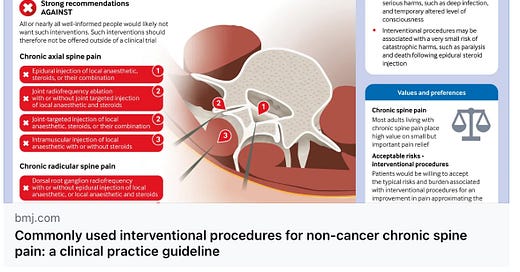February 25, The Earth
489 words of encouragement and understanding
Update on spinal interventions for chronic back pain ~ 2025
I posted this today on LinkedIn.
Highlights from the BMJ editorial by Prof Jane Ballantyne.
* despite the common use of spine injections in pain clinics around the world, it has been hard to come up with evidence that strongly supports this practice when applied to chronic back pain
* spine injections result in little or no pain relief for either axial or radicular back pain, leading the guideline to strongly recommend against their use (Busse JW, Genevay S, Agarwal A, et al. Commonly used interventional procedures for non-cancer chronic spine pain: a clinical practice guideline. BMJ2025;388:e079970 - link in comments)
* one might ask how the situation arose whereby we spend so much of our healthcare capital on a treatment for a common condition that compromises the lives of so many people but seemingly does not work...we learn that treatments that may be highly effective for acute, subacute, or acute-on-chronic pain are often ineffective or problematic when used to treat chronic pain.
* possible reasons why interventions remain prevalent despite bringing about lasting changes are offered, including patient demands (acknowledging an understanding of why a person suffering would cling to the belief an injection would help), demands of trainees to practice techniques, and pressures on providers to keep doing them.
* it adds to a growing sense that chronic pain management needs a major rethink that is perhaps best achieved by a better balance of reimbursements between procedural and non-procedural chronic pain treatments.
Bottom line...
Understanding, easing and transforming pain in the main is an active and personal endeavour by the person.
Passive treatments do not deliver lasting change. They can have a role along the way if the person chooses of course, and in cases when there is a diagnosis with recommended medications and interventions, these are options.
Self-care is not an option, it is the key. How does the person go about their moment to moment life?
Lasting and positive change is only achieved with skilful self-care based on an understanding of pain and how to focus on the step now in a chosen direction.
That is why Pain Coaching and Health Coaches with specific training are delivering results.
Because both focus on the person, their needs and aspirations, and the steps to take to meet and work towards them. This is what brings relief and better quality of life.
The focus is on what the person wants and how to get there -- strategy and skills in the moment to moment.
Getting better and living yourself better is akin to learning a musical instrument.
Look at anyone who has been successful and you will see it is primarily because of what they have done and not what someone has done to them.
There is great hope.
Onwards.
RS





Great read,yes I totally agree.went through all these spinal injections 25 years ago,plus de- nervation of 6 facet joint nerves.
Caused more pain than I would ever want anyone to experience ( the de- nervation).
But I listened at the time to what was offered 🫴 so being human and thinking this may help.
It's normal to want things to help with Chronic Pain.
I definitely wouldn't do it now.Unless symptoms were effecting my bladder etc.
Takes time to learn these things,our choices when seeing a person in a white coat. 🤔